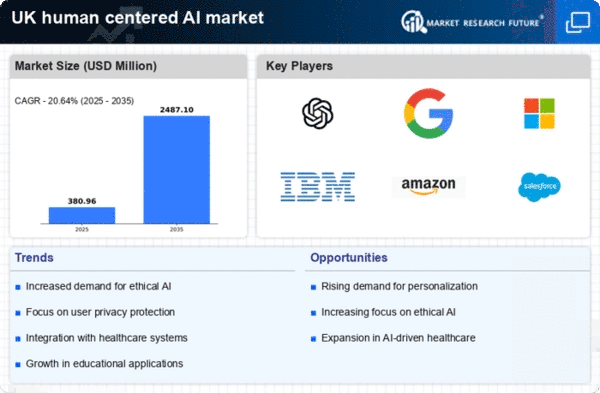Regulatory Frameworks
The establishment of robust regulatory frameworks is a pivotal driver for the human centered AI market. In the UK, the government is actively formulating policies to ensure ethical AI deployment, which is expected to enhance public trust. The UK government has allocated £100 million to support AI research and development, indicating a commitment to fostering innovation while safeguarding societal values. These regulations are likely to shape the operational landscape, compelling companies to align their AI solutions with ethical standards. As a result, businesses that prioritize compliance may gain a competitive edge, potentially leading to a market growth rate of 25% by 2027. This regulatory environment not only promotes responsible AI usage but also encourages investment in human centered-ai technologies, thereby driving market expansion.
Workforce Transformation
The transformation of the workforce due to AI integration is a significant driver for the human centered-ai market. In the UK, businesses are increasingly adopting AI tools to enhance productivity and efficiency, leading to a shift in job roles and skill requirements. A report suggests that 40% of UK jobs could be affected by AI automation, necessitating a focus on reskilling and upskilling the workforce. This transformation is prompting organizations to invest in human centered-ai solutions that facilitate collaboration between humans and machines. As companies adapt to this new landscape, the demand for human centered-ai technologies is expected to rise, potentially resulting in a market growth of 18% by 2026. The emphasis on workforce transformation underscores the importance of human-centered approaches in AI development.
Advancements in AI Technology
Technological advancements in AI are a fundamental driver of the human centered-ai market. The UK is witnessing rapid developments in machine learning, natural language processing, and computer vision, which are enhancing the capabilities of AI systems. These advancements enable more intuitive and effective human-AI interactions, thereby increasing the adoption of human centered-ai solutions across various sectors. For instance, the integration of AI in healthcare has shown promising results, with AI-driven diagnostics improving accuracy by 30%. As these technologies continue to evolve, they are likely to create new opportunities for innovation and application, potentially leading to a market growth of 15% annually. The continuous improvement in AI technology is essential for the sustained growth of the human centered-ai market.
Consumer Demand for Personalization
The increasing consumer demand for personalized experiences is significantly influencing the human centered-ai market. In the UK, consumers are increasingly expecting tailored services, which has prompted businesses to leverage AI technologies to meet these expectations. A recent survey indicated that 70% of UK consumers prefer brands that offer personalized recommendations. This trend is driving companies to invest in human centered-ai solutions that enhance customer engagement and satisfaction. As businesses strive to create more personalized interactions, the market is projected to grow at a compound annual growth rate (CAGR) of 20% over the next five years. This shift towards personalization not only enhances user experience but also fosters brand loyalty, making it a crucial driver in the human centered-ai market.
Increased Investment in AI Startups
The surge in investment in AI startups is a notable driver of the human centered-ai market. In the UK, venture capital funding for AI startups has reached £1.5 billion in 2025, reflecting a growing interest in innovative AI solutions. This influx of capital is enabling startups to develop cutting-edge human centered-ai technologies that address specific consumer needs. As investors seek opportunities in the AI sector, the competition among startups is likely to intensify, fostering innovation and accelerating market growth. The human centered-ai market could see an annual growth rate of 22% as these startups bring fresh ideas and solutions to the forefront. This trend highlights the dynamic nature of the market and the potential for disruptive innovations.
















